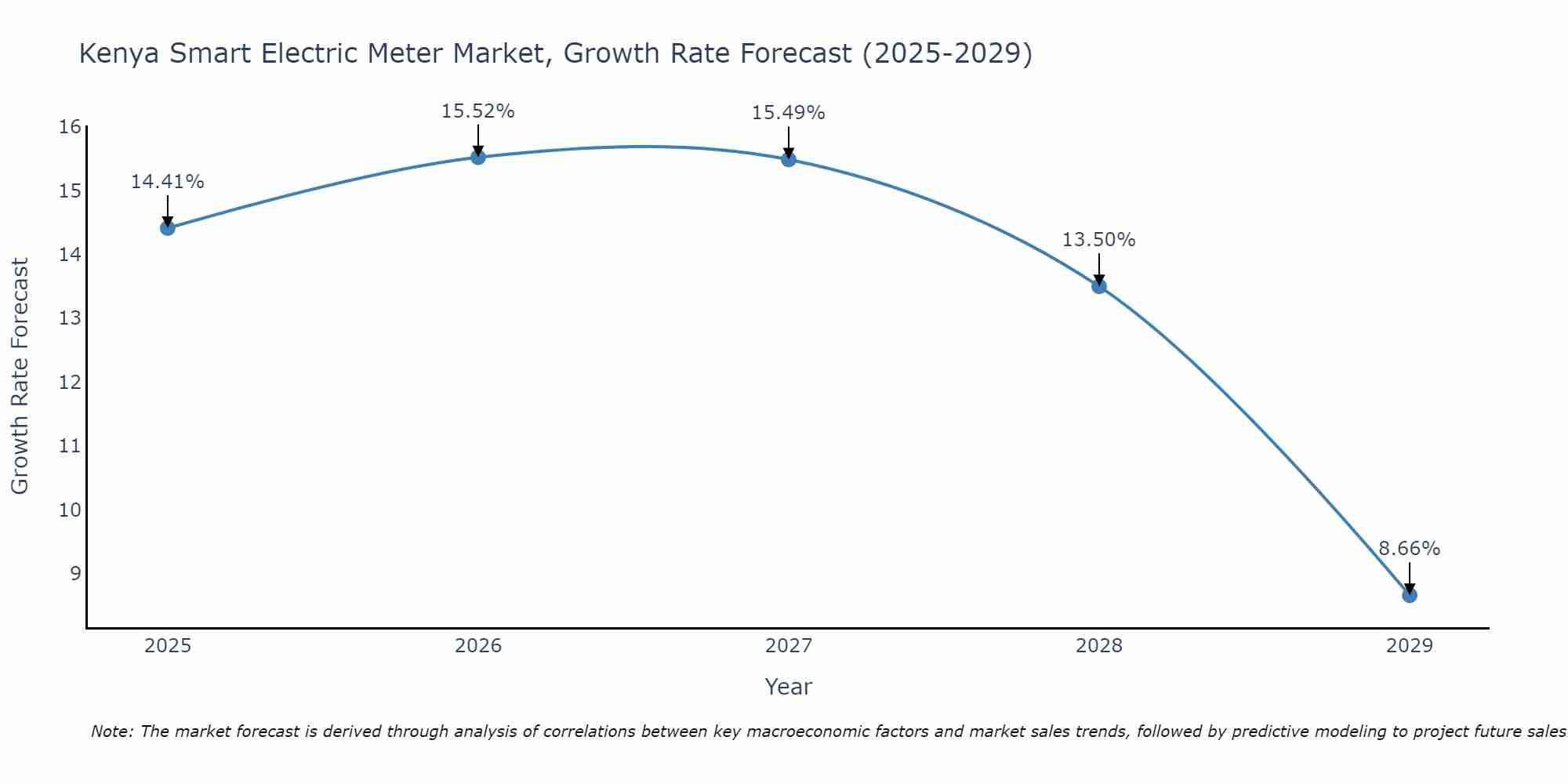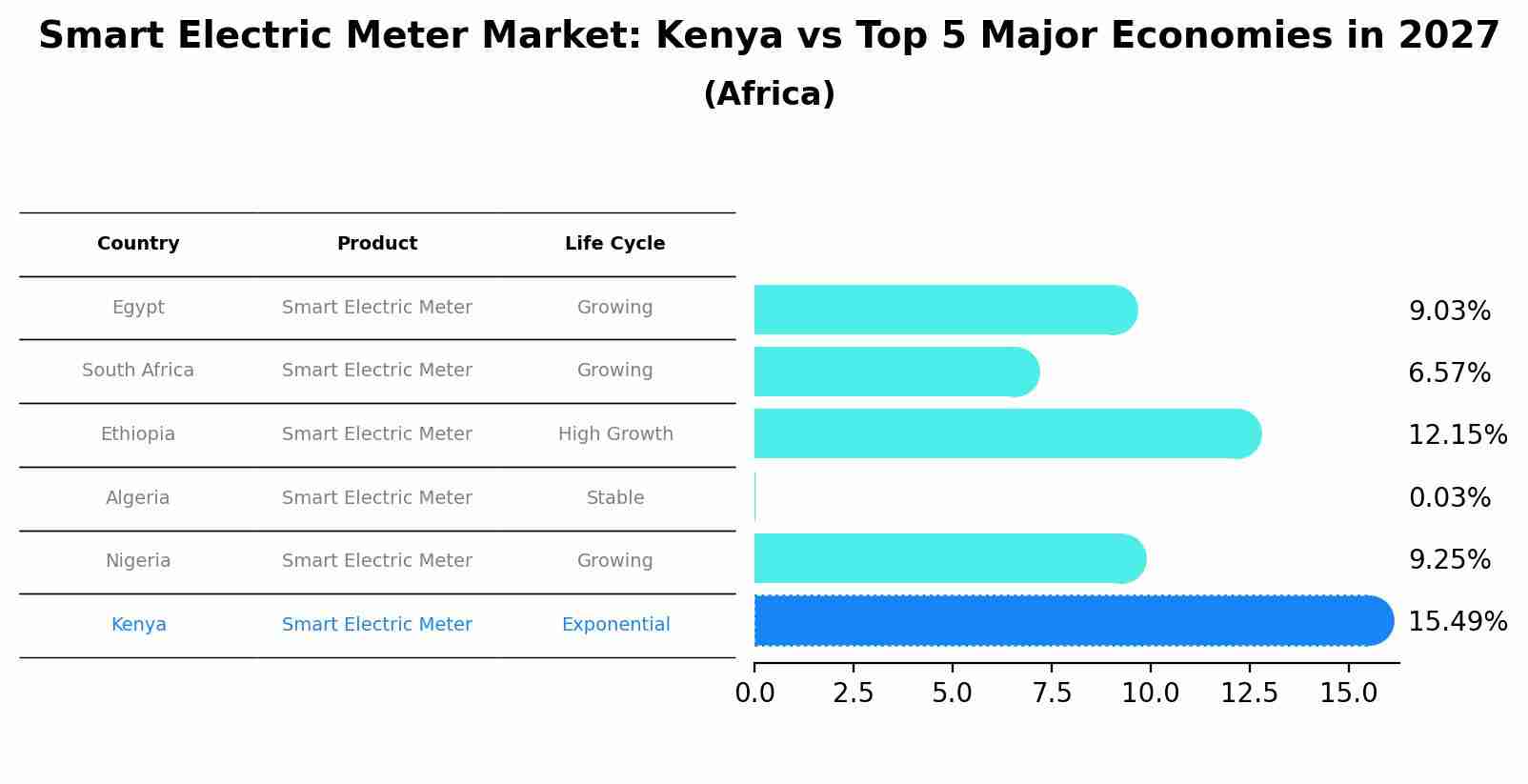Kenya Smart Electric Meter Market Outlook | COVID-19 IMPACT, Analysis, Revenue, Industry, Trends, Growth, Value, Size, Forecast, Share & Companies
| Product Code: ETC369350 | Publication Date: Aug 2022 | Updated Date: Jul 2025 | Product Type: Market Research Report | |
| Publisher: 6Wresearch | Author: Shubham Deep | No. of Pages: 75 | No. of Figures: 35 | No. of Tables: 20 |
Kenya Smart Electric Meter Market Size Growth Rate
The Kenya Smart Electric Meter Market is projected to witness mixed growth rate patterns during 2025 to 2029. Growth accelerates to 15.52% in 2026, following an initial rate of 14.41%, before easing to 8.66% at the end of the period.

Smart Electric Meter Market: Kenya vs Top 5 Major Economies in 2027 (Africa)
In the Africa region, the Smart Electric Meter market in Kenya is projected to expand at a exponential growth rate of 15.49% by 2027. The largest economy is Egypt, followed by South Africa, Ethiopia, Algeria and Nigeria.

Kenya Smart Electric Meter Market Synopsis
The Kenya Smart Electric Meter Market is experiencing robust growth driven by government initiatives to modernize the energy sector, improve efficiency, and reduce technical and commercial losses. Smart electric meters enable real-time monitoring of electricity consumption, remote meter reading, and two-way communication between utilities and consumers, leading to better demand management and accurate billing. Key market players such as Conlog, Landis+Gyr, and Elster are actively expanding their presence in Kenya by offering advanced metering solutions tailored to the local market needs. The increasing adoption of smart grid technologies, rising electricity demand, and the focus on renewable energy integration are further propelling the demand for smart electric meters in Kenya, making it a lucrative market for both domestic and international players.
Kenya Smart Electric Meter Market Trends
The Kenya Smart Electric Meter Market is experiencing significant growth and adoption due to increasing government initiatives for smart grid infrastructure development and the rising demand for efficient energy management solutions. Key trends in the market include the integration of advanced technologies such as IoT and cloud-based platforms to enable real-time monitoring and control of energy consumption. There is also a growing emphasis on data analytics and remote metering capabilities to optimize energy distribution and improve customer service. The market is witnessing a shift towards prepaid smart meters to promote energy efficiency and reduce electricity theft. Additionally, increasing awareness about environmental sustainability and the benefits of smart meters are driving the market towards further expansion and innovation in Kenya.
Kenya Smart Electric Meter Market Challenges
In the Kenya Smart Electric Meter Market, several challenges persist, including high initial costs of deployment and installation, limited consumer awareness and acceptance of smart meters, inadequate regulatory frameworks, and issues related to data privacy and security. Additionally, the lack of consistent power supply in some regions of Kenya poses a challenge for the effective functioning of smart electric meters. Furthermore, the presence of counterfeit and substandard meters in the market hinders the adoption of genuine smart metering solutions. Addressing these challenges will require collaboration between stakeholders, such as government bodies, utility companies, technology providers, and consumers, to drive the widespread adoption of smart electric meters and realize the benefits of improved energy management and efficiency in Kenya.
Kenya Smart Electric Meter Market Investment Opportunities
The Kenya Smart Electric Meter Market presents promising investment opportunities due to the country`s growing focus on improving energy efficiency and reducing electricity theft. The rising demand for smart meters, driven by government initiatives and increasing urbanization, creates a favorable environment for investments in smart meter technology providers, installation services, and data analytics companies. With the potential for cost savings, improved reliability, and better monitoring of electricity consumption, investors can capitalize on the expanding market by partnering with utility companies, participating in pilot projects, or offering innovative solutions tailored to the Kenyan market. Additionally, opportunities for partnerships and collaborations with local stakeholders and international players can further enhance the growth prospects in this dynamic market segment.
Jordan Agar Market Government Policies
The Kenyan government has implemented policies to promote the adoption of smart electric meters in the country. One key policy is the Energy Act of 2019, which mandates the installation of smart meters for all electricity consumers in Kenya. Additionally, the government has established the Kenya Electricity Modernization Project, which aims to modernize the electricity sector through the deployment of smart grid technologies, including smart meters. These policies are in line with the government`s efforts to improve efficiency, reduce losses in the electricity distribution system, and promote sustainable energy practices. The government`s focus on smart electric meters is expected to drive growth in the Kenya Smart Electric Meter Market as utilities and consumers increasingly embrace the benefits of advanced metering infrastructure.
Kenya Smart Electric Meter Market Future Outlook
The future outlook for the Kenya Smart Electric Meter Market is promising, driven by factors such as increasing urbanization, government initiatives to improve energy efficiency, and the growing need for reliable electricity supply. The market is expected to witness significant growth as utility companies in Kenya increasingly adopt smart meters to monitor and manage electricity consumption more efficiently. Additionally, the rising awareness among consumers about the benefits of smart meters, such as real-time data monitoring and cost savings, is likely to fuel market demand. Technological advancements in smart metering systems, including the integration of IoT and data analytics, will further drive market growth in Kenya, making it a lucrative opportunity for both domestic and international smart meter manufacturers.
Key Highlights of the Report:
- Kenya Smart Electric Meter Market Outlook
- Market Size of Kenya Smart Electric Meter Market, 2021
- Forecast of Kenya Smart Electric Meter Market, 2031
- Historical Data and Forecast of Kenya Smart Electric Meter Revenues & Volume for the Period 2018 - 2031
- Kenya Smart Electric Meter Market Trend Evolution
- Kenya Smart Electric Meter Market Drivers and Challenges
- Kenya Smart Electric Meter Price Trends
- Kenya Smart Electric Meter Porter's Five Forces
- Kenya Smart Electric Meter Industry Life Cycle
- Historical Data and Forecast of Kenya Smart Electric Meter Market Revenues & Volume By Phase for the Period 2018 - 2031
- Historical Data and Forecast of Kenya Smart Electric Meter Market Revenues & Volume By Single for the Period 2018 - 2031
- Historical Data and Forecast of Kenya Smart Electric Meter Market Revenues & Volume By Three for the Period 2018 - 2031
- Historical Data and Forecast of Kenya Smart Electric Meter Market Revenues & Volume By Communication Technology Type for the Period 2018 - 2031
- Historical Data and Forecast of Kenya Smart Electric Meter Market Revenues & Volume By Power Line Communication (PLC) for the Period 2018 - 2031
- Historical Data and Forecast of Kenya Smart Electric Meter Market Revenues & Volume By Radio Frequency (RF) for the Period 2018 - 2031
- Historical Data and Forecast of Kenya Smart Electric Meter Market Revenues & Volume By Cellular for the Period 2018 - 2031
- Historical Data and Forecast of Kenya Smart Electric Meter Market Revenues & Volume By End-Users for the Period 2018 - 2031
- Historical Data and Forecast of Kenya Smart Electric Meter Market Revenues & Volume By Industrial for the Period 2018 - 2031
- Historical Data and Forecast of Kenya Smart Electric Meter Market Revenues & Volume By Commercial for the Period 2018 - 2031
- Historical Data and Forecast of Kenya Smart Electric Meter Market Revenues & Volume By Residential for the Period 2018 - 2031
- Kenya Smart Electric Meter Import Export Trade Statistics
- Market Opportunity Assessment By Phase
- Market Opportunity Assessment By Communication Technology Type
- Market Opportunity Assessment By End-Users
- Kenya Smart Electric Meter Top Companies Market Share
- Kenya Smart Electric Meter Competitive Benchmarking By Technical and Operational Parameters
- Kenya Smart Electric Meter Company Profiles
- Kenya Smart Electric Meter Key Strategic Recommendations
Frequently Asked Questions About the Market Study (FAQs):
- Single User License$ 1,995
- Department License$ 2,400
- Site License$ 3,120
- Global License$ 3,795
Search
Thought Leadership and Analyst Meet
Our Clients
Related Reports
- Canada Oil and Gas Market (2026-2032) | Share, Segmentation, Value, Industry, Trends, Forecast, Analysis, Size & Revenue, Growth, Competitive Landscape, Outlook, Companies
- Germany Breakfast Food Market (2026-2032) | Industry, Share, Growth, Size, Companies, Value, Analysis, Revenue, Trends, Forecast & Outlook
- Australia Briquette Market (2025-2031) | Growth, Size, Revenue, Forecast, Analysis, Trends, Value, Share, Industry & Companies
- Vietnam System Integrator Market (2025-2031) | Size, Companies, Analysis, Industry, Value, Forecast, Growth, Trends, Revenue & Share
- ASEAN and Thailand Brain Health Supplements Market (2025-2031) | Strategy, Consumer Insights, Analysis, Investment Trends, Opportunities, Growth, Size, Share, Industry, Revenue, Segments, Value, Segmentation, Supply, Forecast, Restraints, Outlook, Competition, Drivers, Trends, Demand, Pricing Analysis, Competitive, Strategic Insights, Companies, Challenges
- ASEAN Bearings Market (2025-2031) | Strategy, Consumer Insights, Analysis, Investment Trends, Opportunities, Growth, Size, Share, Industry, Revenue, Segments, Value, Segmentation, Supply, Forecast, Restraints, Outlook, Competition, Drivers, Trends, Demand, Pricing Analysis, Competitive, Strategic Insights, Companies, Challenges
- Europe Flooring Market (2025-2031) | Outlook, Share, Industry, Trends, Forecast, Companies, Revenue, Size, Analysis, Growth & Value
- Saudi Arabia Manlift Market (2025-2031) | Outlook, Size, Growth, Trends, Companies, Industry, Revenue, Value, Share, Forecast & Analysis
- Uganda Excavator, Crane, and Wheel Loaders Market (2025-2031) | Strategy, Consumer Insights, Analysis, Investment Trends, Opportunities, Growth, Size, Share, Industry, Revenue, Segments, Value, Segmentation, Supply, Forecast, Restraints, Outlook, Competition, Drivers, Trends, Demand, Pricing Analysis, Competitive, Strategic Insights, Companies, Challenges
- Rwanda Excavator, Crane, and Wheel Loaders Market (2025-2031) | Strategy, Consumer Insights, Analysis, Investment Trends, Opportunities, Growth, Size, Share, Industry, Revenue, Segments, Value, Segmentation, Supply, Forecast, Restraints, Outlook, Competition, Drivers, Trends, Demand, Pricing Analysis, Competitive, Strategic Insights, Companies, Challenges
Industry Events and Analyst Meet
Whitepaper
- Middle East & Africa Commercial Security Market Click here to view more.
- Middle East & Africa Fire Safety Systems & Equipment Market Click here to view more.
- GCC Drone Market Click here to view more.
- Middle East Lighting Fixture Market Click here to view more.
- GCC Physical & Perimeter Security Market Click here to view more.
6WResearch In News
- Doha a strategic location for EV manufacturing hub: IPA Qatar
- Demand for luxury TVs surging in the GCC, says Samsung
- Empowering Growth: The Thriving Journey of Bangladesh’s Cable Industry
- Demand for luxury TVs surging in the GCC, says Samsung
- Video call with a traditional healer? Once unthinkable, it’s now common in South Africa
- Intelligent Buildings To Smooth GCC’s Path To Net Zero


















